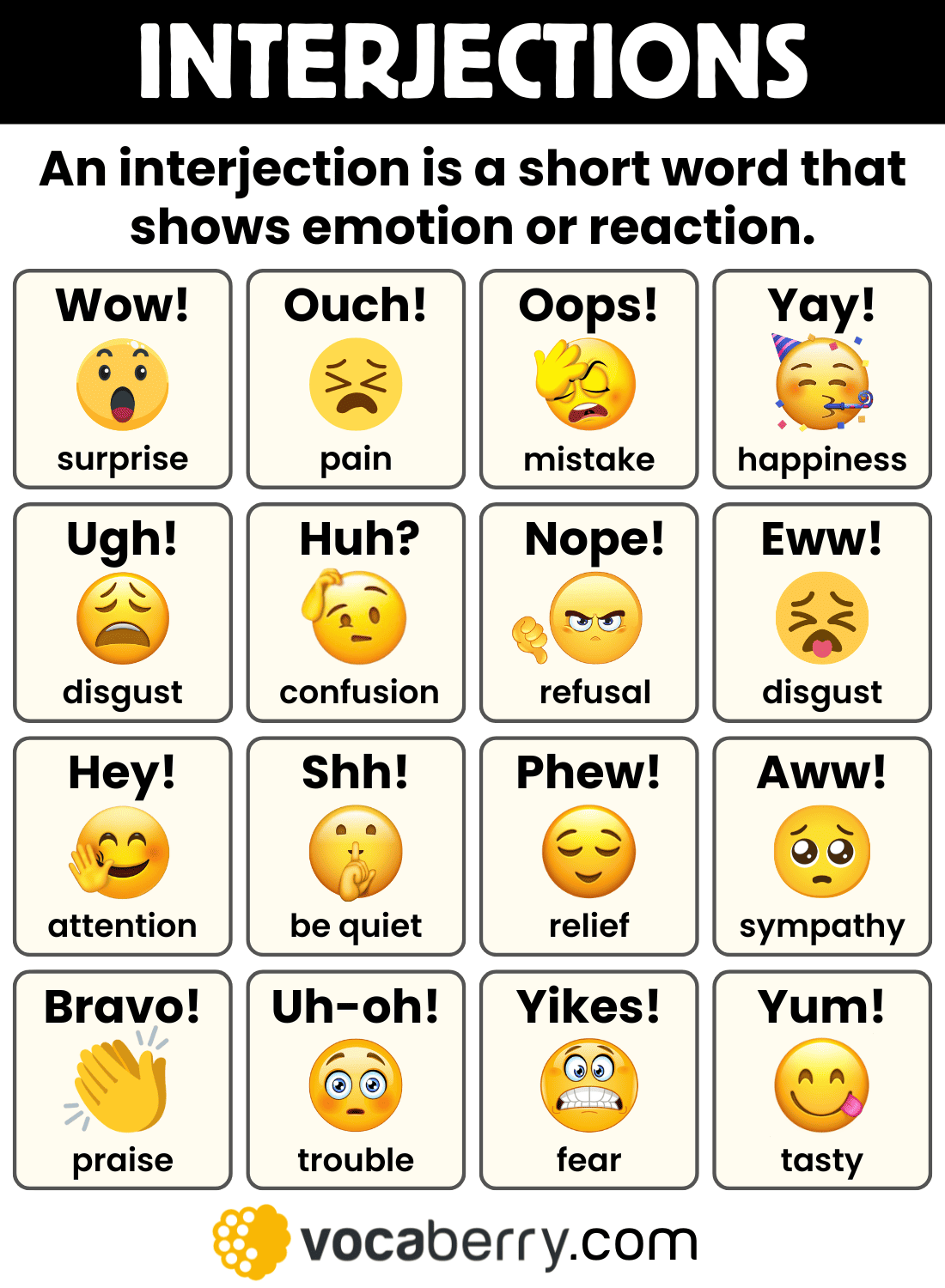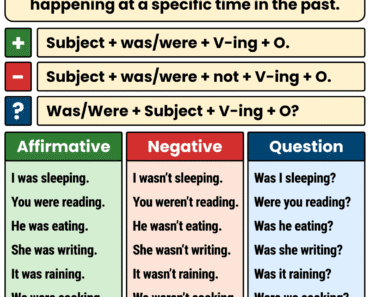English is a language full of emotion, and one of the simplest ways we express that emotion is through interjections. These short, powerful words or sounds can express surprise, happiness, pain, doubt, excitement, or even hesitation — all in just one word. Interjections may seem small or unimportant, but they play a big role in spoken English, conversational tone, and everyday communication.
In this complete guide, you’ll learn what interjections are, how they are used, the different types, and how they function in real sentences. Whether you’re a beginner or just polishing your grammar, this article will help you understand interjections fully and use them naturally in your speech and writing.
What Is an Interjection?
An interjection is a word or short phrase that expresses a sudden emotion, reaction, or feeling. Interjections are usually not grammatically connected to the rest of the sentence. They often stand alone or appear at the beginning of a sentence.
They can show a wide range of emotions, including surprise, joy, anger, pain, agreement, or hesitation. Interjections are very common in spoken English and informal writing, such as texts, conversations, or creative writing.
Examples:
- Wow! That’s amazing!
- Oops! I dropped the glass.
- Uh-oh. We forgot the tickets.
- Hey! Watch out!
Interjections often end in an exclamation mark if they show strong emotion, but they can also be followed by a comma when the emotion is softer or more neutral.
Types of Interjections in English
Interjections come in many forms. They can express feelings, reactions, commands, greetings, or even mental processing. Below are the most common types:
1. Emotive Interjections
These interjections show emotions such as happiness, sadness, fear, anger, or excitement.
Examples:
- Wow! – Surprise
- Yay! – Joy
- Ouch! – Pain
- Oh no! – Worry
- Yuck! – Disgust
- Alas! – Sadness
2. Volitive Interjections
These are used to direct someone’s behavior or grab their attention.
Examples:
- Hey! – Calling someone
- Shh! – Asking for silence
- Look! – Telling someone to observe
- Hush! – Asking someone to stop talking
- Yo! – Informal call to someone
3. Cognitive Interjections
These show thought, hesitation, confusion, or realization.
Examples:
- Hmm… – Thinking
- Uh… – Hesitation
- Huh? – Confusion or question
- Oh! – Realization
- Ah! – Sudden understanding or memory
4. Greeting Interjections
These are used for social interaction, like saying hello or goodbye.
Examples:
- Hi!
- Hello!
- Bye!
- Good morning!
- See ya!
5. Agreement or Disagreement Interjections
These express approval or rejection quickly in casual conversation.
Examples:
- Yep!
- No!
- Yeah!
- Nah!
- Nope!
- No way!
6. Interjections of Approval or Disapproval
These are used to react to performances, opinions, or actions.
Examples:
- Bravo! – Praise
- Well done! – Praise
- Meh. – Lack of interest
- Boo! – Disapproval
How Are Interjections Used in Sentences?
Most commonly, interjections appear at the beginning of a sentence, because they are often the speaker’s first reaction to something. However, they can also occur in the middle or at the end, depending on how spontaneous the emotion is.
Examples:
- Beginning: Oh no! We’re out of time.
- Middle: He was, uh, not very happy about it.
- End: You finished it, wow!
Because interjections are not grammatically related to the rest of the sentence, you can usually remove them and the sentence will still be correct — but the emotional tone will be missing.
How to Punctuate Interjections
Punctuation depends on how strong the emotion is.
a. Use an exclamation mark (!) when the emotion is strong or sudden:
- Yay! We passed the exam!
- Ouch! That hurt!
b. Use a comma (,) when the interjection is softer or part of a sentence:
- Well, I’m not sure.
- Oh, I see what you mean.
c. In writing, you can also use ellipses (…) for hesitation or trailing thoughts:
- Uh… I think we should talk.
List of Common English Interjections
Here’s a helpful reference list of interjections organized by type:
| Emotion/Function | Interjections |
|---|---|
| Surprise | Wow, Oh!, Whoa, Gosh, Goodness! |
| Happiness | Yay, Hooray, Woohoo, Yippee |
| Sadness | Oh no, Aw, Alas |
| Pain | Ouch, Ow, Ahh |
| Disgust | Ugh, Yuck, Ew |
| Confusion/Thinking | Huh, Eh, Hmm |
| Agreement | Yes, Yeah, Yep |
| Disagreement | No, Nope, Nah |
| Attention | Hey, Yo, Look, Shh, Listen |
| Approval | Bravo, Well done, Great job |
| Disapproval | Boo, Meh |
| Greetings | Hi, Hello, Bye, Goodbye, See ya |
Quiz: Interjections in English
Choose the correct interjection for each sentence:
1. ___! That was incredible!
a) Ugh
b) Yay
c) Shh
2. ___, I didn’t expect that!
a) Oh
b) Boo
c) Hi
3. ___! I stepped on a nail.
a) Wow
b) Ouch
c) Eh
4. ___! Be quiet in the library.
a) Hello
b) Shh
c) Uh
5. ___, this cake tastes amazing!
a) Ew
b) Yum
c) Ow
6. ___! You made it on time!
a) Hooray
b) Nah
c) Hmm
7. ___, that’s a strange idea.
a) Oops
b) Ugh
c) Hmm
8. ___! That joke wasn’t funny at all.
a) Yay
b) Boo
c) Yippee
9. ___! I think I left my wallet.
a) Oh no
b) Bravo
c) Hey
10. ___, see you tomorrow!
a) Goodbye
b) Whoa
c) Nope
Quiz Answers
1) Yay
2) Oh
3) Ouch
4) Shh
5) Yum
6) Hooray
7) Hmm
8) Boo
9) Oh no
10) Goodbye







